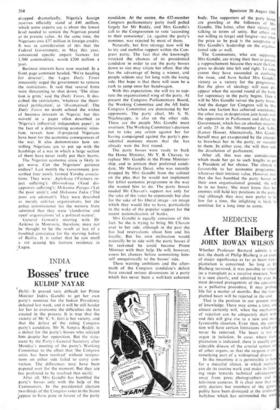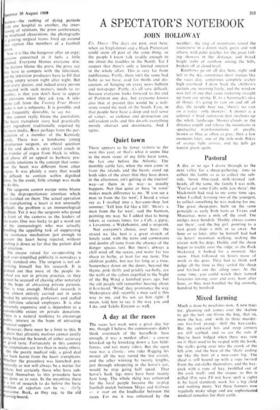MEDICINE
After Blaiberg
JOHN ROWAN WILSON
Whether Professor Barnard admits it or not, the death of Philip Blaiberg is an event of major significance as far as heart trans- plantation is concerned. So long as Dr Blaiberg survived, it was possible to visual- ise a transplant as a curative measure. Now it is seen clearly, and admitted by even the most devoted protagonists of the operation. as a palliative procedure. It may prolon life for a matter of months. But the trans- planted heart will be rejected in the end.
That is the position in our present state of knowledge. There may come a time, and almost certainly will, when the mechanis of rejection can be adequately dealt with and this will give rise to a new and mor favourable situation. Even then, the opera lion will have certain limitations which ca never be removed. The heart is not a organ in isolation. In cases where tran plantation is indicated, there is usually con siderable disease of the arterial system an of other organs, so that the surgeon is onl remedying part of a widespread disease.
In the meantime it is permissible to ho for a merciful silence, in which medicin can do its routine work and make its falter ing steps towards technical advancemen away from press photographers and television cameras. It is clear now that no only doctors but members of the genet public have been dismayed at the irreleva ballyhoo which has surrounded the wh siness—the rushing of dying patients from one hospital to another, the inter- jewing of relations, the press conferences, e misplaced chauvinism, the photographs
t grinning surgical teams lined up around heir captain like members of a football
eleven-
Now it is like the hangover after an orgy;
veryone concerned in it feels a little .hamed. Everyone blames everyone else. he doctors blame the press, the press say ey have to compete with the television, nd the television producers have to fill that ,hing, empty screen night after night. But hat every doctor, and indeed every person innected with such matters, needs to re- ember, is that you don't have to appear n television when they ask you. A tele- hone call from the Twenty Four Hours udio is not a subpoena. It is possible. and uite frequently desirable, to say no.
One cannot really blame the journalists. he heart transplant story had practically cry ingredient traditionally required by he mass media, ilpart perhaps from the par- cipation of a member of the Kennedy There was a handsome young adventurous surgeon, an ethical question
life and death, a spicy racial touch in he transfer of organ from black to white, nd above all an appeal to barbaric pre- ientific emotions in the concept that some- ow the heart was different from other gans. It was plainly a story that would difficult to contain within dignified mits. In the event, little attempt was made
o do this.
The surgeons cannot escape some blame or the disproportionate attention which as lavished on them. The actual operation or transplanting a heart is not unusually Micah; the problem is an immunological roblem. Yet it was the surgeons who posed n front of the cameras as the leaders of he teams. One was lucky to get a word out I the immunologist who was actually andling the appalling task of suppressing the resistance mechanism just enough to revent the heart being rejected, without ushing it down so far that the patient died f infection.
The excuse raised for co-operating in uch over-simplified publicity is nowadays a airly standard one. The surgeon is not ad- ertising himself but his research. It is ointed out that most of the people in- ulved are not in private practice, so they annot be accused of chasing after notoriety n the hope of attracting private patients. his is true enough. Medical research is OW almost entirely carried out in units tided by university professors and staffed Y full-time salaried employees. It is also ttremely expensive and is dependent to a )nsiderable extent on private donations. here is a natural tendency to encourage ublic interest in the hope of attracting inancial support.
However, there must be a limit to this. It 6 plain that altruistic motives cannot justify oing beyond the bounds of either accuracy r good taste. Fortunately in this country he temptations are less than in many others. On the purely medical side, a good deal is been learnt from the heart transplants. h ether the procedure was launched pre- aturely or not will always be a matter for bate, but certainly those who have sub- tted themselves to this procedure have ot done so in vain. In the meantime there
s a lot of research to do before the basic roblem of rejection can be su. - sfu'ly vercome. Back, as they say, to the old awing-board.



































 Previous page
Previous page